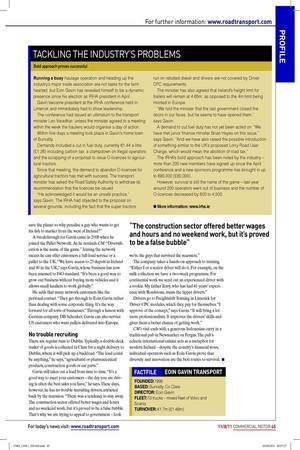TACKLING THE INDUSTRY’S PROBLEMS
Page 40

If you've noticed an error in this article please click here to report it so we can fix it.
Bold approach proves successful Running a busy haulage operation and heading up the industry’s major trade association are not tasks for the fainthearted, but Eoin Gavin has revealed himself to be a dynamic presence since his election as IRHA president in April. Gavin became president at the IRHA conference held in Limerick and immediately had to show leadership.
The conference had issued an ultimatum to the transport minister Leo Varadkar: unless the minister agreed to a meeting within the week the hauliers would organise a day of action. Within five days a meeting took place in Gavin’s home town of Bunratty.
Demands included a cut in fuel duty, currently €1.44 a litre (£1.26) including carbon tax; a clampdown on illegal operators and the scrapping of a proposal to issue O-licences to agricultural tractors.
Since that meeting, the demand to abandon O-licences for agricultural tractors has met with success. The transport minister has asked the Road Safety Authority to withdraw its recommendation that the licences be issued.
“He acknowledged it would be an unsafe practice,” says Gavin. The IRHA had objected to the proposal on several grounds, including the fact that the super tractors run on rebated diesel and drivers are not covered by Driver CPC requirements.
The minister has also agreed that Ireland’s height limit for trailers will remain at 4.65m, as opposed to the 4m limit being mooted in Europe.
“We told the minister that the last government closed the doors in our faces, but he seems to have opened them,” says Gavin A demand to cut fuel duty has not yet been acted on. “We have met junior finance minister Brian Hayes on this issue,” says Gavin. “And we have also raised the possible introduction of something similar to the UK’s proposed Lorry Road User Charge, which would mean the abolition of road tax.” The IRHA’s bold approach has been noted by the industry – more than 200 new members have signed up since the April conference and a new sponsors programme has brought in up to €90,000 (£80,000).
However, survival is still the name of the game – last year around 200 operators went out of business and the number of O-licences decreased by 800 to 4,500.














































